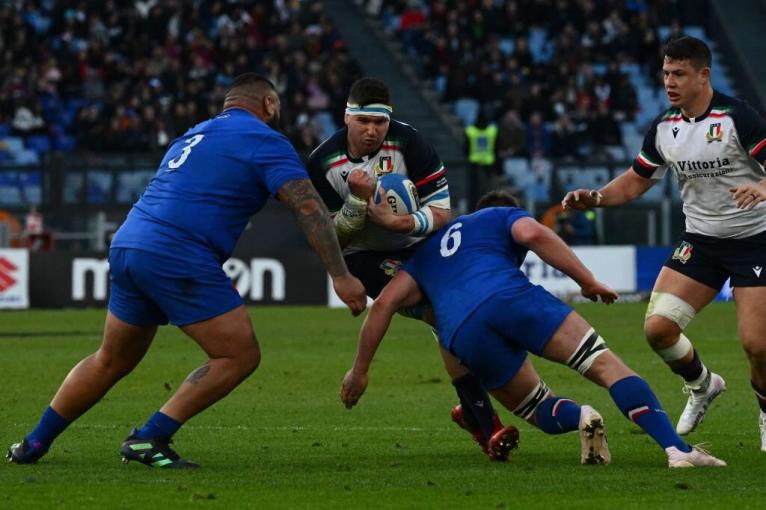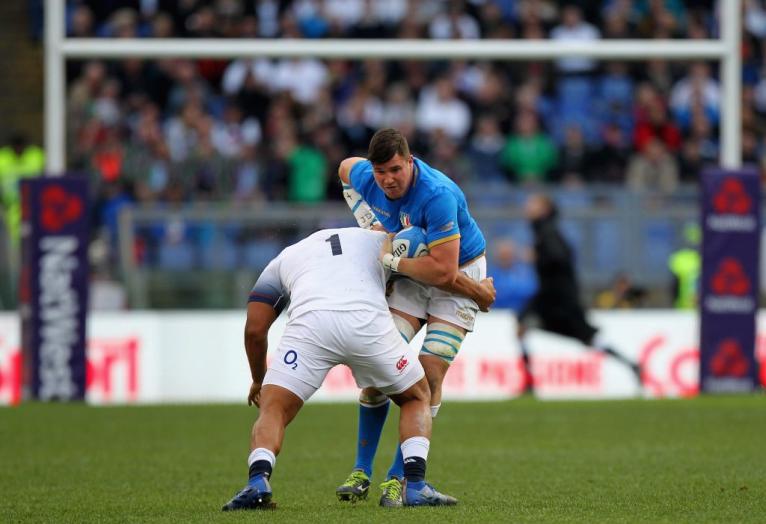Sebastian Negri still remembers the gunshots. A staccato volley piercing the still Zimbabwean night. He was eight years old when a violent gang of war veterans came to seize his family farm. Around the turn of the millennium, Robert Mugabe’s supporters were storming white-owned properties, taking the land they felt had been stolen from them during the colonial era. Now, they were approaching Negri’s door.
The boy’s father, Janusz, ushered his wife and four children into the car and crawled into the darkness. Negri would never see home again.
“I had an amazing upbringing on the farm – that was taken in a matter of twelve hours,” says the Italy flanker. “I remember my dad calling us into the living room, telling us to be quiet and explaining we had to go away for a while, like a holiday. He was trying not to make us worry.
“He said, ‘go to your room, Seb, pack a small bag and make sure you bring your cricket bat and rugby ball’. I remember him saying we were going to go quickly out of the house, and not to say anything. I remember hearing a lot of gunshots. Everything was dark. My dad turned the car lights off and we escaped off the farm.
“I remember looking out the back window, driving out of the driveway, and that was the last time I saw home.”
They broke my aunt’s arms, they cut off half my uncle’s ear. We were lucky in that way that we got out.
The Negris sought safety in Harare, Zimbabwe’s capital. Their extended Italian family offered refuge and aid. Diana, his mother, risked returning home the next day to salvage family possessions. The new ‘residents’ kidnapped her.
“She tried to pack a big trailer with some valuables, furniture, and she was held hostage for twelve hours. That was scary. I don’t know all the details and probably don’t want to know everything.
“The Italian embassy got involved. You’re just hoping nothing goes wrong and nobody gets hurt. The main thing is, she got out safely.
“It was a horrible thing, but a lot of people were a lot worse off than us. A couple of years later, my aunt and uncle are beaten almost to death. They broke my aunt’s arms, they cut off half my uncle’s ear. We were lucky in that way that we got out.”
In the end, the clan settled in South Africa. “The start of our new life,” as Negri puts it. He feels an attachment to many places, his makeup a complex tapestry of Europe and Africa, Italian zest and agricultural ruggedness. It’s how he plays the game.
Negri’s father is full-blooded Milanese. His mother is English-Zimbabwean. Once adjusted to South African life, they put their children through top schools, with Negri attending the prestigious Hilton College rugby factory in Durban. He went on to the Western Province academy, then headed for England, where he studied sports business at Hartpury College. Negri was still with Hartpury when Conor O’Shea gave him a first cap in 2017.

His career has spanned a barren age for Italian rugby. He has 41 caps but only eight wins. He has played in 22 Six Nations Tests and lost them all. Italy’s seven-season drought in the championship ended, sensationally, in Wales last year. They have since backed that up with autumn wins over Samoa and Australia and in pushing France to the death last weekend. Kieran Crowley is developing a highly potent side underpinned by fearless youth.
“I really feel like we’re in a great environment that Kieran has created, it was the same when I worked with him at Benetton,” Negri says. “You want to run through a brick wall for him. Sometimes in work, it’s really important you are a good person before a good rugby player or coach. That gets you respect and a lot of following, and a lot of these boys love playing for Kieran.”
We need to keep proving people wrong. We beat Samoa when a lot of people doubted us, we then beat Australia when people said we never would.
Respect comes up a lot. Crowley’s mission since taking over in summer 2021 has been to restore Italian credibility across the rugby world. No longer can his team be regarded as a meek pushover; nor their seat at Europe’s top table questioned.
“A lot of people saw Italy as a team who shouldn’t be in the Six Nations,” Negri goes on. “An easy team to just go to Rome and dispatch, bonus-point win, send a second team, rest the big boys, easy five points…
“We had to look at ourselves first and foremost and get that respect back. That comes through performance and hard work. We’ve done that and we’re still in the process of doing that.
“We need to keep proving people wrong. We beat Samoa when a lot of people doubted us, we then beat Australia when people said we never would.”

Doesn’t the constant denigration upset the players?
“For sure. I can’t lie and say it didn’t. But when you’re not getting results, people have the right to say that. Yes, it pisses you off but you’ve got to step up to the plate and silence those critics.”
In that regard, France was another step forward. A loss, yes, but taking Fabien Galthie’s all-conquering Grand Slammers to the brink was hugely encouraging. Negri was a tower of strength in Rome. Sixteen carries for 65m into the heaviest of traffic. And there are parts of that game which irk him: the meek loss of two early tries, the lack of streetsmarts and the failure to convert a red-zone set-piece attack with the final play.
“After the game a lot of people were disappointed. We’re not like, ‘well done boys, great effort, massive heart’. Yes, heart is important but it’s not always going to win you games.
“We gifted a lot of points early on and we were very, very close to turning over the second-best team in the world. You think, shit, this could be a tough one after losing two early tries, but we kept calm, focused on our discipline, stuck to our processes and kept in the fight, and that is really important. We’ve got to keep backing that up.
“A lot of people might look at the result and say, ‘France weren’t at it’, rather than it being down to Italy putting them under pressure.”
I want to make my family proud, my close friends proud, and the Italian people proud. They gave me and my family a lot of help in difficult times.
Italian rugby has seen numerous false dawns, but this feels different. There’s a tangible rise in quality and a tangible shift in belief. Crowley has them weaving delightful, creative attacking patterns. They have world-class play-makers in Ange Capuozzo and Paolo Garbisi. Ignacio Brex has been a revelation. And they still have bruisers, Negri the foremost among them, who provide the brawn and the belligerence.
The juggernaut must bar up again on Sunday. Twickenham and a wounded England who have never lost to Italy lie in wait. A brutally tough prospect requiring all of Negri’s ballast.
“I enjoy the responsibility of carrying and sucking defenders in, even if I gain a metre or drag another defender in, if it gives space out wide to someone else then I’m doing my job. We’ve each got our roles to play in making this team a good team. We’ve got to embrace that and give it shit.”
Every time Negri carries the Italian flag on his breast, every time he belts out the lilting anthem, tucks the ball under a meaty arm or braces to fell a charging opponent, he thinks of what the country has given him. He thinks of the hardship and the trauma on the farm. The warmth of his Italian family. The kindness of the people for whom he now goes in to battle.

“That’s why I play with a lot of emotion. I know where I’ve come from. Everyone goes through tough times in life, everyone has their own battles. That’s mine, but I’m grateful for my family and my parents’ positive outlook. That’s why my parents are such big role models to me. The way we look at life is like, shit’s happened, let’s move forward, let’s stay together, we’re better off as a family for it.
“My Italian family were there for us; helped us out financially, supported us because of what had happened. That’s why every time I put on this jersey, I’m not only representing my close family in Italy, I’m representing my broader family. I’m so proud of that.
“I want to make my family proud, my close friends proud, and the Italian people proud. They gave me and my family a lot of help in difficult times. They are very close to me. That makes it that wee bit more special that I get to represent them on a Saturday throwing around a rugby ball.”


"taking the land they felt had been stolen from them during the colonial era"
the land had been stolen, and the requisitions were entirely justified. I'm very sorry that Negri's family were hurt but this article is basically just propaganda for apartheid.